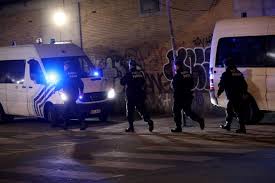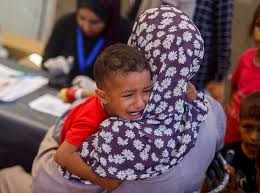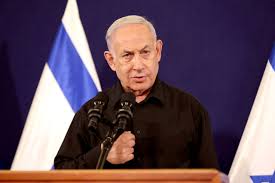F.P. Report
NEW YORK: On Monday (27 September), Ireland will convene a high-level briefing on the non-proliferation of weapons of mass destruction to mark the 25th anniversary of the opening for signature of the Comprehensive Test Ban Treaty (CTBT). Simon Coveney, Ireland’s Minister for Foreign Affairs and Minister for Defence, will chair the meeting. The expected briefers are UN High Representative for Disarmament Affairs Izumi Nakamitsu, Executive Sec-retary of the Compreh-ensive Nuclear-Test-Ban T-reaty Organisation Robert Floyd, and a civil society representative. Ireland circulated a concept note ahead of Monday’s briefing, which is one of the signature events of its Council presidency. It says that the meeting will focus on the CTBT’s goals and achievements and will provide Council members with an opportunity to lend impetus to promote the treaty’s entry into force. The CTBT, which prohibits states parties from carrying out “any nuclear weapon test explosion or any other nuclear explosion”, opened for signature on 24 September 1996. While it is nearly universally accepted, it has yet to enter into force. To date, 185 states have signed the treaty, and 170 have ratified it. Before entering into force, all 44 states designated as “nuclear-capable” and listed in Annex 2 of the treaty must sign and ratify it. Of the 44 specified states, China, Egypt, Iran, Israel, and the US have signed but not ratified the treaty, and the Democratic People’s Republic of Korea (DPRK), India and Pakistan have yet to sign it.
The most recent Council meeting on the CTBT took place in 2016, on the eve of the 20th anniversary of the treaty’s opening for signature. At that meeting, the Security Council adopted resolution 2310, the first and only Council resolution on the CTBT to date. It stressed the vital importance and urgency of achieving the treaty’s early entry into force and affirmed that doing so will contribute to the enhancement of international peace and security. Resolution 2310 recognised that the monitoring elements of the CTBT verification regime, including the International Monitoring System (IMS), “contribute to regional stability as a significant confidence-building measure”. The resolution urged all states, particularly the eight remaining Annex 2 states, to ratify the treaty without further delay and to uphold their national moratoria on nuclear weapons testing.
Nakamitsu is likely to provide an update on the work of the UN Office for Disarmament Affairs, wh-ich supports efforts aimed at the non-proliferation and total elimination of nuclear weapons. Nakamitsu may highlight the Secretary-General’s “Securing Our Common Future: An Agenda for Disarmament”, published in 2018, which o-utlines concrete paths to re-suming dialogue and negotiations for nuclear arms control and disarmament.
Floyd, who was elected as CTBTO Executive Secretary in May, is likely to outline his plan and vision for furthering the treaty’s entry into force and advancing the work of the Preparatory Commission for the CTBTO. (Set up in 1996, the Preparatory Commission is an interim multilateral body tasked with developing the global verification regime of the CTBT, which must be operational when the treaty enters into force.) He may also draw attention to the ways in which the verification regime has proven capable of effectively monitoring nuclear testing and describe its uses in the fields of climate change research and disaster warning. Since 1999, the UN Secretary-General has convened a biennial conference, known as the Article XIV conference (named after the relevant Treaty article), as part of ongoing efforts to promote the treaty’s entry into force. At Monday’s meeting, Italy and South Africa are expected to apprise Council members of the proceedings of this year’s Article XIV Conference, which was held on 23 and 24 September. They may also highlight key elements of this year’s Final Declaration, which was adopted by conference participants on 23 September. The declaration contains a list of 15 concrete and actionable steps that can be taken to promote the treaty’s universalisation and early entry into force.
The concept note which was prepared by Ireland suggests several questions to help guide the discussion at Monday’s briefing:
How can the entry into force of the CTBT, which is a key element of the global disarmament and non-proliferation architecture, be promoted, including throu-gh the Treaty on the Non-Proliferation of Nuclear W-eapons (NPT) Review Pro-cess? How can the objectives set out in resolution 2-310 be advanced, and the international norm against nuclear tests strengthened, including through the im-portant interim role that the moratorium on testing pla-ys? How can the Prepar-atory Commission for the CTBTO be better supported to complete its work on formulating the global verification regime and to ensure that it is operational by the time the treaty enters into force? How can the wider community, including civil society, academia and the private sector, help to promote the CTBT?
Several Council members may raise the threats posed by the proliferation of nuclear weapons in some country situations. During this year’s Article XIV Conference, several members, including Ireland, discussed efforts to denuclearise the Korean peninsula. At that meeting, Ireland called on the DPRK to sign and ratify the CTBT, to return to the NPT, and to cooperate with the Interna-tional Atomic Energy Age-ncy (IAEA). On 3 Septe-mber 2017, the DPRK ann-ounced that it had conducted its sixth nuclear test si-nce 2006 (and its first since the adoption of resolution 2310 in 2016). The incident, which was detected b-y the CTBT’s IMS, was m-et with widespread conde-mnation and a raft of new sanctions unanimously ad-opted by the Security Cou-ncil. The US may emphasise its support for the CTBT and note its zero-yield nuclear explosive testing moratorium, which it continues to observe. While all Council members recognise the importance of observing such moratoria, some will likely stress that these measures do not have the same permanent and legally binding effect as the CTBT and should therefore not be seen as a substitute for ratification of the treaty. Ireland and Mexico—both of which are members of the New Agenda Coalition (NAC), a group of countries seeking to make progress on nuclear disarmament within the General Assembly’s First Comm-ittee—may be particularly critical of the eight remaining Annex 2 states and call on them to immediately sign and ratify the treaty.
It appears that Ireland had considered altering the format of Monday’s meeti-ng to an open debate, but e-ncountered resistance from some Council members, and decided to retain the briefing format.






